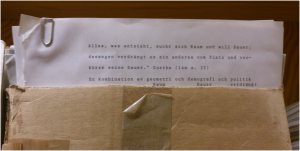Last week a paper I co-authored with Donggen Wang at Hong Kong Baptist University has appeared in the Annals of American Geographers. In this paper we argue that the Day Reconstruction Method devised by Daniel Kahneman and colleagues can be usefully linked to time-geography. One benefit of doing this is that what Mei-Po Kwan calls the Uncertain Geographical Context Problem (UGCoP) — spatiotemporal uncertainty in the actual areas or places that exert influence on the behaviour and experiences of individuals — that has characterised past studies of the geographical context on individuals’ subjectively experienced well-being. Another benefit is that the effect of spending time together with others (family members or friends) on one’s subjectively experienced well-being can be measured and examined more precisely.
Using data from Hong Kong we found that the influence of the actual location where people spend time for daily activities other than paid work is very limited (at least as far as we were able to measure characteristics of that location); the effect of where individuals live on their overall life satisfaction was much stronger. Further work is therefore required to better measure and examine how the places where people spend time affects their subjective experience of well-being.
We did find that doing things together with others makes them happier than doing the same things alone, and it also appears that the relationship between the duration of a daily activity and people’s subjectively experienced well-being depends on with how they have undertaken that activity. One implication of this finding is that the relationships between social capital and subjectively experienced well-being cannot be examined or understood properly without due attention for individuals’ everyday life — i.e. their actual time-use and space-time path.
A limited number of free copies of the article is now available from here.

